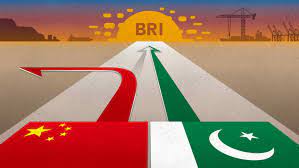Published:July 06,2022
By Staff writer

The US and its allies in G7 seem to be engaged in a battle of wits with China when they launched an infrastructure project to counter China’s Belt and Road Initiative (BRI). The Build Back Better World initiative, named after Biden’s domestic spending and climate agenda, struggled to get off the ground because not enough G7 partners contributed financially when it was unveiled. In a recent G7 meeting in Germany, The Build Back Better World Initiative was re-branded the “Partnership for Global Infrastructure and Investment.”
With the Biden administration in the front seat, called on G7 leaders to agree to fund the launch of projects in middle- and low income countries to the tune of $600 billion over the next five years. The investment money is expected to come from private sector investments,funding from the US Development Finance Corporation and Export-Import Bank and other commitments from foreign governments.
The first hitch analysts’ believe the US led attempt to outdo China is that its G7 allies are likely to focus more on urgent domestic priorities such as part as the G7 prioritizes other issues such as taming inflation. Secondly, in a research paper presented by the Chatman House towards the end of June, Chatman house presents the COVID-19 economic recovery and Russia’s war with Ukraine as serious factors likely to affect Biden’s dream to sabotage China.
“Russia’s invasion of Ukraine in early 2022 and the uncertain economic recovery from COVID-19 threaten to undermine progress,” the report by Chatham House said. “Changing priorities among donor nations, driven by events in Ukraine, risk a further shift in development policy towards bilateralism and fragmentation within the G7 and with recipient nations.”
Speaking about US lead efforts to counter China Belt and Road Initiative, Chinese Foreign Ministry spokesman Zhao Lijian said that his country welcomed any initiative that promoted global infrastructure but dismissed the thinking that the US lead infrastructure project is intended to counter China. “We believe there’s no such thing as relevant initiatives countering or replacing each other. What we oppose are moves to advance geopolitical calculations and smear the BRI in the name of promoting infrastructure development,”Zhao said.
According to analysts, the US lead global infrastructure program with Europe cannot succeed because it is a politicized tool in response to China’s Belt and Road Initiative. “If this new initiative is too focused on ‘countering China’ it will be unsuccessful. Global South countries that are on the receiving end of this investment don’t care about US-China competition. They don’t want to choose; they just want more investment, “said Stephen Smith, an academic at the University of Toronto’s Munk School of Global Affairs and Public Policy.
The West has struggled to respond to China’s Belt and Road Initiative for more than a decade, according to Gyude Moore, a former minister of public works in Liberia. “Their sharp critique of Chinese loans and lending practices was not accompanied by a credible alternative,” said Moore.
According to an opinion poll of African youthconducted by the South Africa-based IchikowitzFamily Foundation, today, China is the most influential foreign power in Africa. The survey found that China is widely viewed as having a positive influence, rated at 76 percent of respondents. According to official figures, in 2020, China implemented BRI projects worth $80 billion globally. It should be noted that China’s infrastructure programs are implemented with no political strings attached. The projects are implemented under equal and willing partnership with the purpose of achieving shared prosperity for a better future.
 Africa -China Review Africa -China Cooperation and Transformation
Africa -China Review Africa -China Cooperation and Transformation
